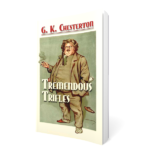There are several best introductions to Chesterton. Tremendous Trifles is one of the best of the best. It has only one disadvantage that I can think of: it is currently out of print. Fortunately, many of the essays from this collection are available elsewhere, such as on certain web sites and in the newly released On Lying in Bed and Other Essays from Bayeux Arts. And a lot of them have been reprinted in Gilbert.
Tremendous Trifles contains simply some of the best essays Chesterton ever wrote. They originally appeared in the Daily News, which Chesterton contributed to from 1901 to 1913, and which explains why people bought that paper. Besides the quintessential “On Lying in Bed,” the book includes “The Advantages of Having One Leg,” “The Dragon’s Grandmother,” “What I Found in My Pocket,” “A Piece of Chalk” (which could have been called “What I Found I Was Sitting On.”) and the incomparable explanation of juries: “The Twelve Men.”
But to get back to “Bed,” has any essay ever written had a better first line than this: “Lying in bed would be an altogether perfect and supreme experience if only one had a coloured pencil long enough to draw on the ceiling.” I remember the first time I read that sentence. I realized with abounding delight that I had found in Chesterton a friend forever, a companion with whom I wanted to spend my time and that none of that time would be vacant. For though the line appears to be utter nonsense, and has all the appeal of utter nonsense, we follow the laughter to a startling truth. Chesterton does not write merely to amuse; he amuses to make a point. And the point is never as light and airy as it first appears. It doesn’t seem like much to learn that the purpose of lying in bed is that it should have no purpose. There should be no excuse for it, no reason, no justification. So? So this: our simple pleasures should not be connected to a regimen or some scheme, or worst of all, to a habit. Moreover, our simple pleasures – like lying in bed – should not be denied for something over-rated like excessive wealth or even excessive health. These are secondary things. They are not the primary things. It is the primary things which have been ignored, and the secondary things which have been emphasized all out of proportion. “If there is one thing worse than the modern weakening of major morals,” says Chesterton, “it is the modern strengthening of minor morals. Thus it is considered more withering to accuse a man of bad taste than of bad ethics. Cleanliness is not next to godliness nowadays, for cleanliness is made an essential and godliness is regarded as an offence.” Chesterton can see from a century ago that the world was headed to a time when smoking a cigar would be considered more offensive than performing an abortion.
And it is in this essay that he explains, almost as an aside, that whiteness – as in the whiteness of a white ceiling about to be painted as Michelangelo might paint the Sistine Chapel – whiteness represents Paradise. Whiteness, like Paradise, means purity, and it also means freedom.
Which is an idea so large it spills over into another essay, “A Piece of Chalk.” Here Chesterton describes how he has set out to do some drawing with his chalks, but is distressed to find that he has forgotten his white chalk. White is essential. White is a color. It is not merely the absence of color. It is “a shining and affirmative thing…it draws stars.” As white is to art, so is virtue to religion. Virtue is a positive thing; not merely “the absence of dangers or the avoidance of moral dangers…Chastity does not mean abstention from sexual wrong; it means something flaming, like Joan of Arc.”
In this book, Chesterton looks at the ordinary, common things and asks us to see how extraordinary and uncommon they are. The things in his pockets, the objects in a railway station, the people in the street. With these simple, random things he can defend Christianity, Western Civilization and Democracy. “Whatever is it that we are all looking for?” he asks at the beginning of an essay entitled “A Glimpse of My Country.” He suggests that what we are looking for lies very close; we just don’t manage to see it. It is a theme throughout the book, and throughout Chesterton’s writings that what appears to be a trifle is actually tremendous. In the title essay Chesterton crystallizes this truth in a perfect sentence that would go on to be inscribed on buildings and quoted by popes: “The world will never starve for want of wonders; but only for want of wonder.”

